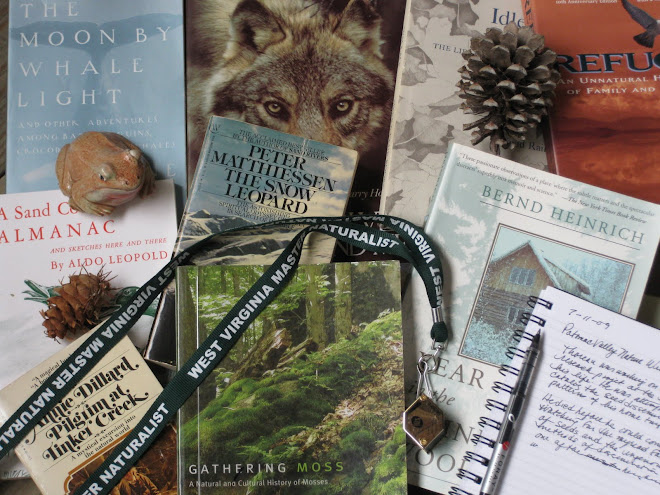
On a sharply chilly January 3, 2010 we marked twelve months of Reader's Club meetings and warmed to a brand new year of great reads and fresh insights.
The six members present (including one new--welcome!) gave Diane
Ackerman's The Moon by Whale Light a thorough going over. This book is actually more like 4 books in one--it combines four lengthy essays on different groups of animals: bats,
crocodilians, whales, and penguins.
We all praised Ms.
Ackerman's skills in acute observation, bell-like clarity of expression, the breath-taking figurative language for which she is so well known, and her sense of humor. We also noted that her focus in this particular book included not only incredible detail regarding the natural history of the creatures being studied by the researchers whom she interviews and accompanies, but also on the very human natures of the researchers themselves. Some liked this facet of the book, others felt it was a distraction.
Although the essays were not originally written to be published together, we did detect a theme of human misconceptions about animals and the ensuing harm humans have caused to them. For example, bats being feared as evil, rabies-carrying, bloodsucking creatures of the night, attacking humans and getting tangled in hair--when actually they are highly important contributors to our planetary ecosystem, one of the least likely of critters to convey rabies to humans, are major pollinators, consumers of harmful insects, attentive parents, and all around remarkable and fascinating mammals. Sorely misunderstood in previous years, bat populations have been decimated severely by human actions, intentionally, and more passively, by loss of habitat. Bats colonies are also dying out due to a disease. To promote bat conservation, including installing bat houses go to
http://www.batcon.org/A related theme was how much we owe to dedicated researchers such as the ones profiled in the book--but also the vast amount there is to yet to learn. A whale researcher in the book remarks that "once people learn about [an animal] their indifference, which is always based on ignorance, will be replaced with fascination, which is based on knowledge." Questions about the very concept of intelligence and its expression in animals and in humans is woven through the warp of
Ackerman's descriptions. The whale researcher again: "What we call intelligence may only be a kind of vandalism, just mischief on a grand scale. It might not be the only form mind can take, and it might have little to do with real wisdom. " Something to mull over next time you are sitting in commuter traffic.
Read this book and you will be astonished at what you learn about bats,
crocs, whales and penguins. It has inspired us to learn more about these creatures, especially about our native species of bats. This is also a great read for those interested in exploring the historical relationship between humans and animals, and perhaps, for nurturing hope for the future.
 At our February 7, 2010 meeting (CANCELLED DUE TO BLIZZARD OF 2010) we will discuss Bernd Heinrich's Winter World. Biologist Heinrich is the author of numerous award-winning books, including the bestselling Winter World, Mind of the Raven, and Why We Run, (he has also had a career as a top long distance runner) and has received countless honors for his scientific work. His most recent published book is Summer World. He studied at the University of Maine and UCLA, and is professor emeritus of biology at the University of Vermont. He divides his time between Vermont and the forests of western Maine.
At our February 7, 2010 meeting (CANCELLED DUE TO BLIZZARD OF 2010) we will discuss Bernd Heinrich's Winter World. Biologist Heinrich is the author of numerous award-winning books, including the bestselling Winter World, Mind of the Raven, and Why We Run, (he has also had a career as a top long distance runner) and has received countless honors for his scientific work. His most recent published book is Summer World. He studied at the University of Maine and UCLA, and is professor emeritus of biology at the University of Vermont. He divides his time between Vermont and the forests of western Maine.


